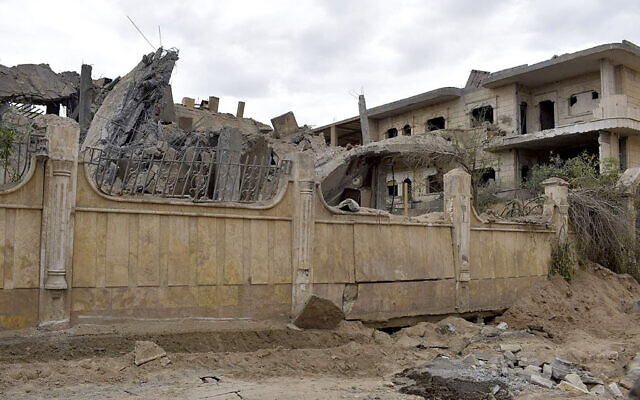The Israeli Air Force was responsible for overnight airstrikes in eastern Syria, which reportedly killed several Iranian-linked operatives, The Times of Israel has learned.
The strikes in the Deir-ez-Zor or and al-Boukamal area targeted assets belonging to Iran’s Unit 4000, the Special Operations Division of the Islamic Revolutionary Guards Corps’ Intelligence Organization, and the special operations unit of the IRGC’s Quds Force in Syria, known as Unit 18840, according to Israeli defence sources.
Yesterday, the Shin Bet announced that it had foiled attempts by those two Iranian units to smuggle advanced weapons to West Bank Palestinian terrorists.
The strikes overnight, defence sources say, were a response to the smuggling attempts and targeted assets related to the Iranian plot.
Israel is aware that several Iranian or Iran-linked operatives were killed in the strikes. The UK-based Syrian Observatory for Human Rights, previously accused of inflating tolls and false reporting, claims nine were killed in the strikes.
Israel targets sites belonging to IRGC units involved in attempts to smuggle advanced arms to West Bank terrorists; Quds Force officer among the dead
The UK-based Syrian Observatory for Human Rights, previously accused of inflating tolls and false reporting, claimed 15 people, most of them pro-Iran fighters including an IRGC official, were killed in the strikes.
The Observatory said that an IRGC adviser, “his two Iranian security escorts, two Syrian fighters” and five other combatants belonging to pro-Iran groups were killed in a villa in Deir Ezzor city.
The Observatory also said that a few hours earlier, an Iranian cargo plane flew from Damascus to the eastern city of Deir Ezzor carrying technical equipment and IRGC soldiers.
Syrian-Saudi normalization seeks political re-emergence, regional influence
Syria is actively pursuing Arab and Saudi normalization with the aim of breaking free from its political isolation within the Arab and international communities, according to a Syrian politician.
Issam Dimashqi, politician and member of the executive office of the Citizenship Movement in Syria, an opposition civilian-political organization, told North Press that the Syrian government was seeking to normalize relations with Arab states in general and Saudi Arabia in particular to put an end to its political isolation and secure much-needed funds for reconstruction.
On March 14, Faisal Mekdad, Minister of Foreign Affairs and Expatriates of Syria, met with his Saudi counterpart, Prince Faisal bin Farhan in Saudi Arabia to enhance dialogue between the two countries.
In an exclusive statement to North Press, Dimashqi explained that the country is also keen on addressing its ongoing economic problems, which are rapidly pushing it towards a state of total collapse.
In contrast, Saudi Arabia has displayed a strong desire to adopt a new policy in the region, especially in Syria to obtain regional influence in the fragile country where the influence of other major players such as Iran, Russia, Turkey, and the United States, is steadily growing.
The politician indicated that Saudi Arabia is keen on playing a role in finding a solution to the Syrian crisis to mitigate the negative consequences that have spilled over into neighboring countries and to address the problem of drug smuggling which has become a significant social issue both in Saudi Arabia and the wider region.
Syrians missing, dying from torture in jihadist-run prisons
France 24 published a report on the dire situation of the prisons run by HTS and other radical groups in Northern Syria.
The report says in Syria’s Idlib province, controlled by the jihadist group Hayat Tahrir al-Sham (HTS), a crackdown on alleged “agents” has led to accusations of torture and rights abuses.
The death of Abdel-Kader al-Hakim in custody has sparked protests against HTS, an alliance led by Syria’s former Al-Qaeda affiliate, now designated a terrorist organization by several Western countries.
Despite promises of reform by HTS leader Abu Mohammed al-Jolani, residents and activists demand the release of detainees amid growing evidence of torture reminiscent of practices in Syrian government prisons.
The UN has indicated that HTS may have committed war crimes, including torture and unlawful deprivation of liberty. The situation has led to a rare public outcry in a region scarred by a conflict that has claimed over 500,000 lives and displaced millions.
This article was translated and edited by The Syrian Observer. The Syrian Observer has not verified the content of this story. Responsibility for the information and views set out in this article lies entirely with the author.


